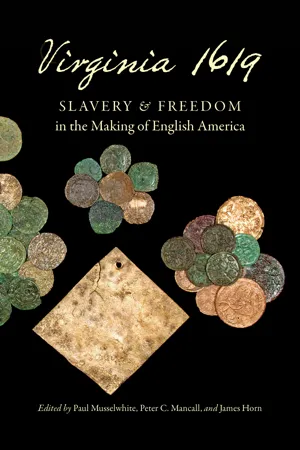
Published by the Omohundro Institute of Early American History and Culture and the University of North Carolina Press
Slavery and Freedom in the Making of English America
- 384 pages
- English
- ePUB (mobile friendly)
- Available on iOS & Android
Published by the Omohundro Institute of Early American History and Culture and the University of North Carolina Press
Slavery and Freedom in the Making of English America
About This Book
Virginia 1619 provides an opportunity to reflect on the origins of English colonialism around the Chesapeake Bay and the Atlantic world. As the essays here demonstrate, Anglo-Americans have been simultaneously experimenting with representative government and struggling with the corrosive legacy of racial thinking for more than four centuries. Virginia, contrary to popular stereotypes, was not the product of thoughtless, greedy, or impatient English colonists. Instead, the emergence of stable English Atlantic colonies reflected the deliberate efforts of an array of actors to establish new societies based on their ideas about commonwealth, commerce, and colonialism. Looking back from 2019, we can understand that what happened on the shores of the Chesapeake four hundred years ago was no accident. Slavery and freedom were born together as migrants and English officials figured out how to make this colony succeed. They did so in the face of rival ventures and while struggling to survive in a dangerous environment. Three hallmarks of English America--self-government, slavery, and native dispossession--took shape as everyone contested the future of empire along the James River in 1619. The contributors are Nicholas Canny, Misha Ewen, Andrew Fitzmaurice, Jack P. Greene, Paul D. Halliday, Alexander B. Haskell, James Horn, Michael J. Jarvis, Peter C. Mancall, Philip D. Morgan, Melissa N. Morris, Paul Musselwhite, James D. Rice, and Lauren Working.
Frequently asked questions
Information
Index
Table of contents
- Front Cover
- Title Page
- Copyright Page
- Contents
- Acknowledgments
- Introduction
- Before 1619
- “The Savages of Virginia Our Project”: The Powhatans in Jacobean Political Thought
- Race, Conflict, and Exclusion in Ulster, Ireland, and Virginia
- Virginia Slavery in Atlantic Context, 1550 to 1650
- Bermuda and the Beginnings of Black Anglo-America
- “Poore Soules”: Migration, Labor, and Visions for Commonwealth in Virginia
- Private Plantation: The Political Economy of Land in Early Virginia
- “A Part of That Commonwealth Hetherto Too Much Neglected”: Virginia’s Contested “Publick” and the Origins of the General Assembly
- The Company-Commonwealth
- “These Doubtfull Times, between Us and the Indians”: Indigenous Politics and the Jamestown Colony in 1619
- Brase’s Case: Making Slave Law as Customary Law in Virginia’s General Court, 1619–1625
- Virginia and the Amazonian Alternative
- From John Smith to Adam Smith: Virginia and the Founding Conventions of English Long-Distance Settler Colonization
- Notes on the Contributors
- Index
- Back Cover